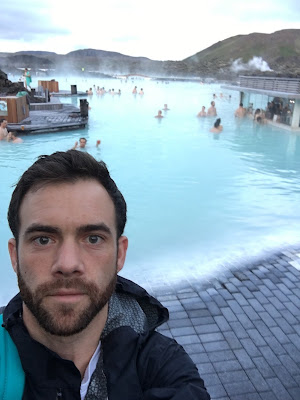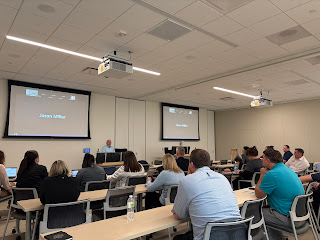Alumni Q&A: Competencies for Early Careerists
 |
| Nathan Patton (MHA, MBA '11) at Iceland's Blue Lagoon, one of National Geographic's 25 wonders of the world, in July 2017. |
By: Nora Kopping (MHA ’17)
Nathan
Patton joined Deloitte Consulting after graduating from the University of
Iowa’s dual MHA/MBA program in 2011. His leadership responsibilities at
Deloitte have grown since that time, and he was recently promoted to a Senior
Manager position. Together with his colleague, Steve Birchard (MA ’86), Patton
will present “Observations on Executive Stature – Tales from the Field” at the
Department of Health Management and Policy’s first annual Drive-In event.
Nora Kopping: What motivates you every
day?
Nathan
Patton: The impact we have on our clients. As I have grown and been promoted in
my career, I have gained a broader, more holistic view of the work going on at
Deloitte. At this level, it becomes apparent how impactful a lot of our work
is, not just to specific departments or projects, but to entire businesses.
At
Deloitte, we work for basically everyone, and we do just about everything. The
health system in America continues to be disconnected, and so I think a lot of
the value that we add is bringing insights from other industries and sectors to
our clients. When you work on so many different projects for so many different
companies, you start to make a meaningful – albeit sometimes indirect – impact on
the system as a whole.
NK: What are some of the most essential
relationship skills you need to do your job well?
NP:
Number one is knowing your audience. Number two is being able to adapt your
working style to that audience. You can tell the same story and have the same
talking points, but you might need to present it differently to the CEO of the
company in a one-on-one meeting than to a group of directors. The level of
detail that you share with one audience and how you present that message is
going to be very different than how you present it to a different audience.
Being able to modify your working style and your presentation style is very
important.
Number
three is making sure you have a point of view, not just on the direct topic at
hand, but in general. The more engaging you are, and the more you can show that
you’re plugged in with what is going on in the industry, the more you and the
other person are going to get out of that relationship.
NK: Looking back, what were some of
your favorite experiences as a graduate student at Iowa?
NP:
On the MHA side, my favorite class was the capstone class with Ken Kates (CEO
of University of Iowa Hospitals and Clinics). I remember Chris Klitgaard (MHA
’99 and CEO of MediRevv) and Ian Montgomery (MA ’79 and Executive in Residence
in the Department of Health Management and Policy at the University of Iowa)
were involved in that course as well. On the MBA side, my favorite experience
was the Henry Fund, an actively managed equity portfolio for which students
provide analyst reports and build financial models. Those two classes provided
practical, real-world experience in the classroom.
NK: Iowa’s MHA program encourages
students to develop relationships with executive mentors. Have you had
important mentor relationships so far in your career? What have you learned
from them?
NP:
Yes, I have. One of my mentors is Steve Birchard (MHA ’86), who I will present
with next week. I emailed Steve out of the blue when I was looking for jobs,
and that was how I first got to know him. I have also had three to five other
mentors at Deloitte that I have met through projects. These mentors have taken
me under their wings in various respects, whether it’s helping me navigate a
huge organization like Deloitte or giving me pointers on how to be successful
in my roles. They have also given me opportunities to shadow them. Whether it’s
sitting in on meetings as a fly on the wall, or being cc’d on communications,
or listening in on a call, observations are valuable. A lot of times early in
your career, you are in a position of “you don’t know what you don’t know.”
Until you get exposure to a situation, it’s hard to know how you might respond
to it. Getting opportunities to observe your mentors is incredibly valuable,
and I am lucky to have had the chance to do that.
NK: Why should an MHA graduate consider
consulting?
NP:
Consulting is fast-paced and a very interesting industry. You get incredible
exposure to executives. You are also able to travel to (hopefully) interesting
locations, and engage with smart, down-to-earth colleagues. And honestly, the
pay is a lot better than the fellowship route. Consulting is a great experience
and a career accelerator, even if you decide it isn’t the right fit for you
long-term. I have heard from countless executives that two or three years of
consulting work is the equivalent of five or six years of industry experience.
NK: What are some of the most important
competencies that MHA students who aspire to be in leadership roles should
focus on developing early in their careers?
NP:
The most important competency is developing relationships. You don’t have to
enter the workforce with a network built out, but you need to be comfortable
fostering relationships. Most jobs are filled through informal, back-channel
routes and there is a reason for that. People will hire you not because you are
friends, but because they know the quality of work you do. The first component
of that is doing a good job, which is where business acumen comes in. Focus on
learning strategy, finance, and management skills because they will be
applicable in every situation you’ll be in. The second component is developing
relationships. You have to do a good job, but you also have to make sure that
people know you do a good job.
NK: At the Drive-In event, you will be
speaking about executive stature. What does executive stature mean to you?
NP:
This goes back to what I said earlier. You need to know your audience, and you
need to be able to tailor your message to that audience. Part of that is what
you say, and part of that is how you say it. What you say is a matter of how
much knowledge and credibility you have. How you say it should be influenced by
the person you are speaking to – not just their role and their level, but also
their preferences and working style.
There
are lots of different people out there: some like a lot of detail, some don’t
like a lot of detail, some like lengthy conversations, and some like to get
right to the point. Knowing what the person on the other end of that
conversation prefers and what their working style is really impacts your
executive presence. If someone just wants a high-level view in five minutes,
and you go in there and ramble because you’re expecting an hour-long
conversation, it doesn’t matter how smart you are or how strong your message
is. If you can’t get that message across in a meaningful way to that person,
you don’t have executive presence. You become the bumbling idiot across the
table.
NK: What are some ways you have seen
health care leaders effectively wielding their executive stature?
NP: The most meaningful messages I have seen
are not messages that everyone automatically agrees with, but messages that
truly speak to the day-to-day life of the people in the audience. It’s an art
and a science. The science is that you’re going into a conversation with an
agenda and a clear message. The art is how you actually communicate the
message.
I
have been really impressed with leaders who can go in never having met the
person before, and within a couple of minutes, they can dive to the heart of
what the client wants to hear and what matters to the client. And the client
just loves it. It’s not because they know the client inside and out. It’s
because they know how to read people and they know the industry. Executive
stature is all about reading your audience and being able to speak to what
resonates with them.
Nathan Patton (MHA, MBA ’11) and Steve
Birchard (MA ’86) will deliver the keynote address for the University of Iowa
Department of Health Management and Policy’s first annual Drive-In event on
Friday, September 29. To register for this event, please visit the registration webpage.



Comments
Post a Comment